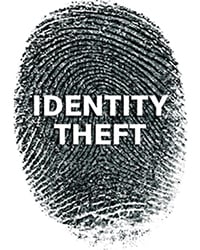 Identity theft: the fraudulent acquisition and use of a person’s private identifying information, usually for financial gain.
Identity theft: the fraudulent acquisition and use of a person’s private identifying information, usually for financial gain.
Identity theft refers to the preparatory stage of acquiring and collecting someone else's personal information for criminal purposes. As of January 8, 2010, Senate Bill S-4 became law, making it illegal to possess another person's identity information for criminal purposes.
What Is Identity Fraud?
Identity fraud is the actual deceptive use of the identity information of another person (living or dead) in connection with various frauds (including for example impersonating another person, and the misuse of debit card or credit card data).
The Facts
- Identity theft techniques can range from unsophisticated, such as dumpster diving and mail theft, to more elaborate schemes.
- Technology, mainly the Internet, facilitates more elaborate schemes, such as skimming, phishing, and hacking as criminals gather profiles of potential victims. Computer spywares and viruses, designed to
help thieves acquire personal information, are an emerging trend. - Victims of identity theft or fraud can experience financial loss and difficulty obtaining credit or restoring their "good name".
- The Canadian Anti-Fraud Centre (CAFC) maintains statistics on the complaints they receive.
- In 2009, the CACF received identity fraud reports from 11,095 Canadian victims, totaling a loss of more than 10 million dollars. This represents an increase of more than 1 million dollars of what was reported in 2008. Payment card fraud was the most commonly reported incident, and yet, many instances of identity theft and fraud go unreported.
What Are They Looking For?
Identity thieves are looking for the following information:
- full name
- date of birth
- Social Insurance Numbers
- full address
- mother’s maiden name
- username and password for online services
- driver's license number
- personal identification numbers (PIN)
- credit card information (numbers, expiry dates and the last three digits printed on the signature panel)
- bank account numbers
- signature
- passport number
The new legislation on identity theft provides a complete list of identity documents.
The new section 402.1 of the Criminal Code lists the definition and examples of identity information.
What Can Your Information Be Used For?
Criminals can use your stolen or reproduced personal or financial information to:
- access your bank accounts
- open new bank accounts
- transfer bank balances
- apply for loans, credit cards and other goods and services
- make purchases
- hide their criminal activities
- obtain passports or receive government benefits
Using identity theft to facilitate organized criminal and terrorist activities also appears to be a growing trend.
How Can You Find Out If Your Identity Has Been Stolen?
The best way to find out is to monitor your hard copy or on-line financial accounts frequently and to check your credit report regularly for any unusual activities. If you receive calls from collection agencies about unfamiliar accounts, or if you applied for credit and were unexpectedly turned down, you should investigate further.
Report It!
If you suspect or know that you are a victim of identity theft or fraud, or if you unwittingly provided personal information or financial information:
- Step 1 - Contact your local police force and file a report.
- Step 2 - Contact your bank/financial institution and credit card company
- Step 3 - Contact the two national credit bureaus and place a fraud alert on your credit reports.
- o Equifax Canada
Toll free: 1 800 465-7166 - o TransUnion Canada
Toll free: 1 877 525-3823 - Step 4 - Always report identity theft and fraud. Contact the Canadian Anti-Fraud Centre
Stop It!
Prevention is the best way to deal with this crime:
- Identity theft can occur over the Internet or telephone, or via fax or regular mail. Therefore, be particularly wary of unsolicited e-mails, telephone calls or mail attempting to extract personal or financial information from you.
- Ask yourself if you really need all of the identity documents you carry in your wallet or purse. Remove any you don't need and keep them in a secure place instead.
- Periodically check your credit reports, bank and credit card statements and report any irregularities promptly to the relevant financial institution and to the credit bureaus.
- During transactions, it's safer to swipe your cards yourself than it is to allow a cashier to do it for you. If you must hand over your card, never lose sight of it.
- Always shield your personal identification number when using an ATM or a PIN pad.
- Memorize all personal identification numbers for payment cards and telephone calling cards. Never write them on the cards.
- Familiarize yourself with billing cycles for your credit and debit cards.
- Trash bins are a goldmine for identity thieves. Make sure you shred personal and financial documents before putting them in the garbage.
- When you change your address, make sure you notify the post office and all relevant financial institutions (your bank and credit card companies).

